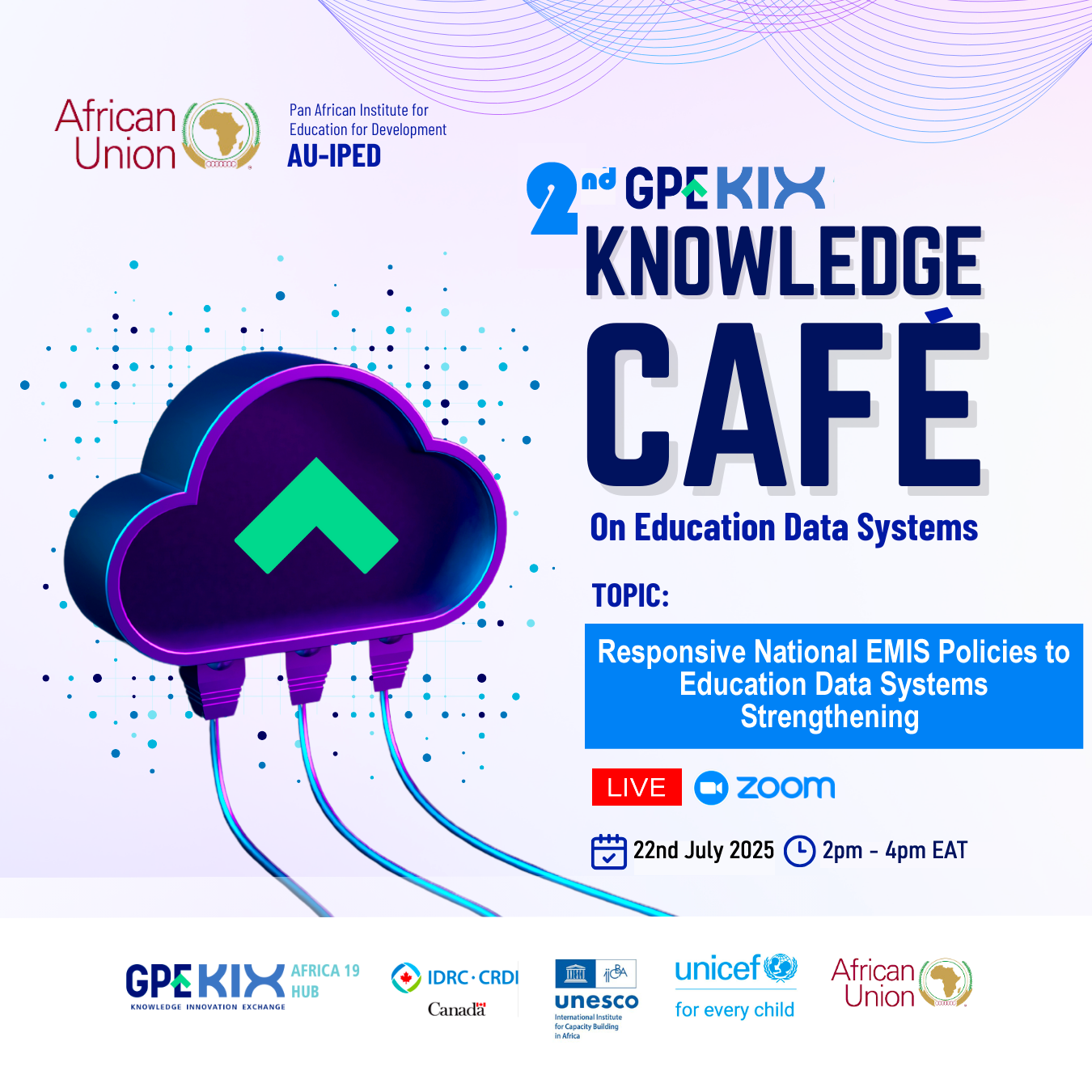AU-IPED Hosts Knowledge Café to Deepen Peer Learning on Responsive Education Data Systems
AU-IPED Hosts Knowledge Café to Deepen Peer Learning on Responsive Education Data Systems

Over 15 African countries engage in cross-country dialogue on strengthening national EMIS policies The African Union Commission, through its Pan African
Institute for Education for Development (AU-IPED), convened the 2nd KIX Knowledge Café on Education Data Systems on 22 July 2025. Held virtually, the event brought together policymakers, EMIS leads, and technical experts from more than 15 African countries to share experiences and discuss innovations in policy and practice to strengthen national Education Management Information Systems (EMIS).
The event is part of AU-IPED’s leadership of the “Meeting the Data Challenge” thematic area under the KIX Africa 19 Hub , a regional platform supported by the Knowledge and Innovation Exchange (KIX), a joint initiative of the Global Partnership for Education (GPE) and Canada’s International Development Research Centre (IDRC). The Café focused on how countries are developing and refining responsive national EMIS policies to strengthen education planning and delivery.
Opening the session, Mr. Adoumtar Noubatour, Head of AU-IPED, emphasized the African Union’s commitment to strengthening EMIS in line with the Continental Education Strategy for Africa (CESA 16–25) and Agenda 2063.
“Reliable, timely, and actionable data is at the heart of effective education policy. As the institution mandated to lead the continental education data agenda, AU-IPED remains committed to supporting Member States in building responsive, sustainable EMIS frameworks,” he noted.
The session featured national EMIS leads and directors from the Ministries of Education in South Sudan, Nigeria, Mozambique, and The Gambia - along with a spotlight from KIX grantee Zizi Afrique, who highlighted lessons from country-led efforts to enhance EMIS. Presenters explored a range of practical experiences in policy formulation, digital transformation, and leveraging open-source tools to improve data quality, accessibility, and use.
The first intervention was made by Zizi Afrique Foundation, a KIX grantee based in Kenya, and they demonstrated how school-level innovations can feed national systems. Their project explores ways to collect and use data from learners and teachers to inform classroom practices and policy dialogue. “KIX provides a unique platform for government, researchers, and implementing partners to co-create scalable solutions for Africa’s education systems,” said Charles Gachoki, Research Lead at Zizi Afrique.
The Ministry of Education in Kenya shared recent developments regarding the country’s EMIS, underscoring ongoing reforms and opportunities for improved data use at scale.
Nigeria presented on efforts to modernize data management by integrating feedback loops into EMIS, allowing teachers and local officials to interact with national dashboards. “We are developing a new data feedback mechanism that connects teachers directly to national dashboards,” shared Abdulgafar Otunola, from the Nigerian Ministry of Education.
Mozambique shared its journey from manual data collection to plans for a fully digital EMIS. Ricardo Cuco, Head of Statistics at the Ministry of Education and Culture, described the national vision for developing an online platform that allows for real-time data entry and analysis. “From piloting DHIS2 to developing offline data dashboards, we’re focused on reaching the hardest-to- reach with real-time data for planning,” said Mr. Cuco.
South Sudan reflected on the need to build EMIS capacity across ministries and the challenges of data reliability in fragile contexts. Their contribution focused on current data collection efforts and underscored the importance of international support for sustainable system development.
Participants also explored technical options for improving EMIS platforms, including integrating them with national statistics bureaus and piloting tools such as DHIS2 and SOFIA to support real-time data collection, visualization, and school-level decision-making.
“What gets measured gets improved. Our work aims to ensure schools are not just data providers but data users,” noted Polycarp Otieno, Education Specialist at UNICEF ESARO, during a panel discussion on data accessibility and equity-focused reporting.
The final intervention was from The Gambia, and they showcased its success in deploying DHIS2 for education data management. Their experience highlighted the value of adapting open- source health platforms for education, as well as the importance of training, decentralization, and feedback loops in effective data use.
Key issues raised by countries included:
- Limited availability of qualified EMIS personnel.
- Infrastructure and connectivity gaps in remote regions.
- Insufficient data use for policy decisions.
- Challenges in achieving system interoperability.
- Need for sustainable financing models to implement and maintain robust EMIS frameworks.
Recommendations emerging from the session included:
- Strengthening EMIS policies to ensure reliable data collection, coordination, and long- term improvements in education planning and service delivery
- Recruiting and training EMIS personnel at school, local government, and national levels
- Investing in foundational and digital infrastructure, such as solar-powered devices and stable internet connectivity, to enable schools - especially in remote areas, to reliably collect, manage, and use education data.
- Piloting digital platforms such as DHIS2 and SOFIA to support real-time, school-level data collection and visualization that informs timely decision-making.
- Establishing data feedback mechanisms that ensure information flows both to national policymakers and back to teachers and school leaders for continuous improvement.
- Promoting cross-country collaboration by adapting and sharing open-source EMIS tools, policy templates, and system designs to support peer learning and scalable innovation.
Moderated by Mr. Lukman Jaji, Policy Officer at AU-IPED, the session promoted an open dialogue between government representatives, researchers, and development partners.
In his closing remarks, Patrick Walugembe, Senior Program Officer at IDRC, praised the diversity of perspectives and reaffirmed the value of KIX in advancing data-driven decision- making:
“The KIX Africa 19 Hub continues to demonstrate the power of peer learning in unlocking new solutions. We are encouraged by the appetite for collaboration and innovation seen across the region, and we remain committed to supporting countries in turning data into action.”
The Knowledge Café continues to serve as a vital platform for African education stakeholders to exchange knowledge, share lessons, and collectively advance the continent’s education data systems. A follow-up Knowledge Café focusing on EMIS financing is planned for later this year.








